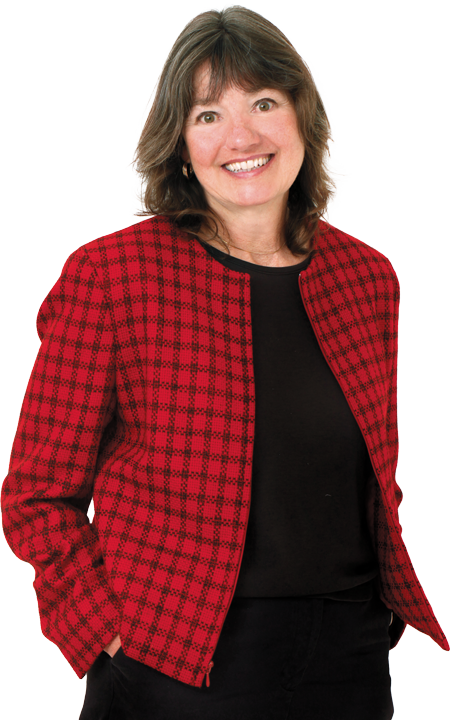Alumni News
Denise Grady ’78G
“What stays with me most vividly are the people: their faces, their voices, their stories, the unexpected truths they revealed — sometimes after I put my notebook away — that shook or taught or humbled me, and reminded me that this beat is about much more than all the data I had tried to parse over the decades,” she wrote in her farewell column last June. “It is a window into the ways that illness and injury can shape people’s lives, and the tremendous differences that advances in medicine can make, for those who have access to them.”
Grady started as a reporter in the science news department of The New York Times in September 1998 after writing for The Times for several years as a freelancer. She had also written for Scientific American, Vogue, Discover, Time magazine and other publications.
She graduated with a biology degree from SUNY-Stony Brook in 1973, and a few years later moved to the Seacoast with her husband, who was working on his chemistry Ph.D. at UNH. She took a few afternoon classes — with Tom Carnicelli on rhetoric and with Hugh Potter in American studies. In a 2010 UNH Magazine article, she recalled her first interaction with English professor and renowned writing coach Donald Murray ’48 during that time. Carnicelli encouraged her to speak with Murray about the graduate writing program, but she was hesitant. Then, a tenacious Murray chased her down. “He said, ‘You really should apply.’ He was so encouraging. You look back and realize there are these pivotal moments in your life. That was one of them. I would never dared apply if he hadn’t encouraged me.”
She credits the guidance she received from Murray and her advisor, Andy Merton, with helping to shape her career, including something Murray would say about himself: “I may not be the smartest or most talented person, but I can come in early and stay late.”
The advice from those two mentors was something that steered her throughout much of her writing career. Shortly after retiring, she recalled what she terms more pivotal moments during her years of reporting; “where you hear somebody say something that really hits you either as a revelation, or just puts everything in perspective and you learn from it.”
One such moment came when she was in Rwanda doing a story about people who wind up with severe heart disease at a young age because the region lacks treatment for children with strep throat. “I was talking to this 18-year-old girl who wanted to be a doctor. I knew, and I think she knew, she was not going to able to do that. She died about a year later,” Grady recalls. “I can still see her face: She had hopes and ambitions and it was just not going to happen.”
Grady’s retirement amid the COVID-19 pandemic — which she covered extensively for The Times with stories about vaccines, government response, frontline workers and more — presented a unique perspective, when coupled with her lengthy career covering viral outbreaks and the responses to them around the globe.
“This was the big one, epidemiologists had been saying this could happen, a highly contagious respiratory virus could become a pandemic, but for so many it was one of those things you hear people say, but you almost don’t literally believe it will happen,” she says. She remembers the early days — earlier than most of us think of as the start of the pandemic. “Scary reports started coming out of China, and we know they have a history of covering things up like they did with the SARS outbreak,” she recalls.

“If we really had jumped hard on it, would it have made a difference? I don’t know … I keep thinking it might have. And should we have pushed back on the early advice (that only medical workers needed to wear masks) that we now know was clearly wrong?” she wonders.
Her advice for younger reporters draws on her decades of experience. “Go back a year later or two years later to see what’s changed for the people and the places you’ve covered. I wish I had made time more often to go back, because when I was able to do it was always fascinating and really rewarding.”
She did go back to visit a little boy who had surgery in utero for spina bifida — to see him running after a T-ball years later. “It was quite an experience. I actual saw him as a fetus, and then to see him chasing his two dogs around the house,” she says. “I say: Keep all those emails and telephone numbers of people you meet along the way.”
“If we really had jumped hard on it, would it have made a difference? I don’t know … I keep thinking it might have. And should we have pushed back on the early advice (that only medical workers needed to wear masks) that we now know was clearly wrong?” she wonders.
Her advice for younger reporters draws on her decades of experience. “Go back a year later or two years later to see what’s changed for the people and the places you’ve covered. I wish I had made time more often to go back, because when I was able to do it was always fascinating and really rewarding.”
She did go back to visit a little boy who had surgery in utero for spina bifida — to see him running after a T-ball years later. “It was quite an experience. I actual saw him as a fetus, and then to see him chasing his two dogs around the house,” she says. “I say: Keep all those emails and telephone numbers of people you meet along the way.”
